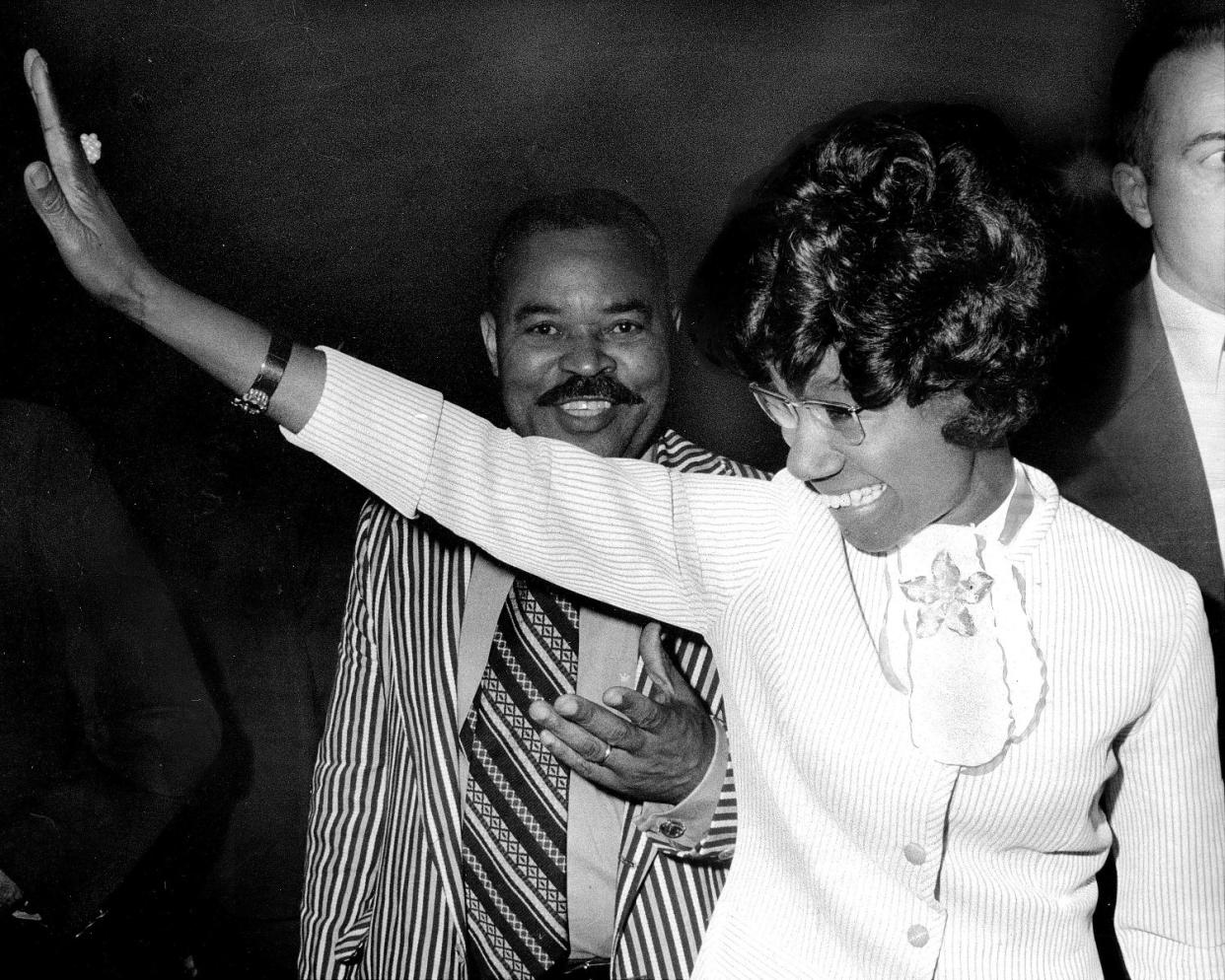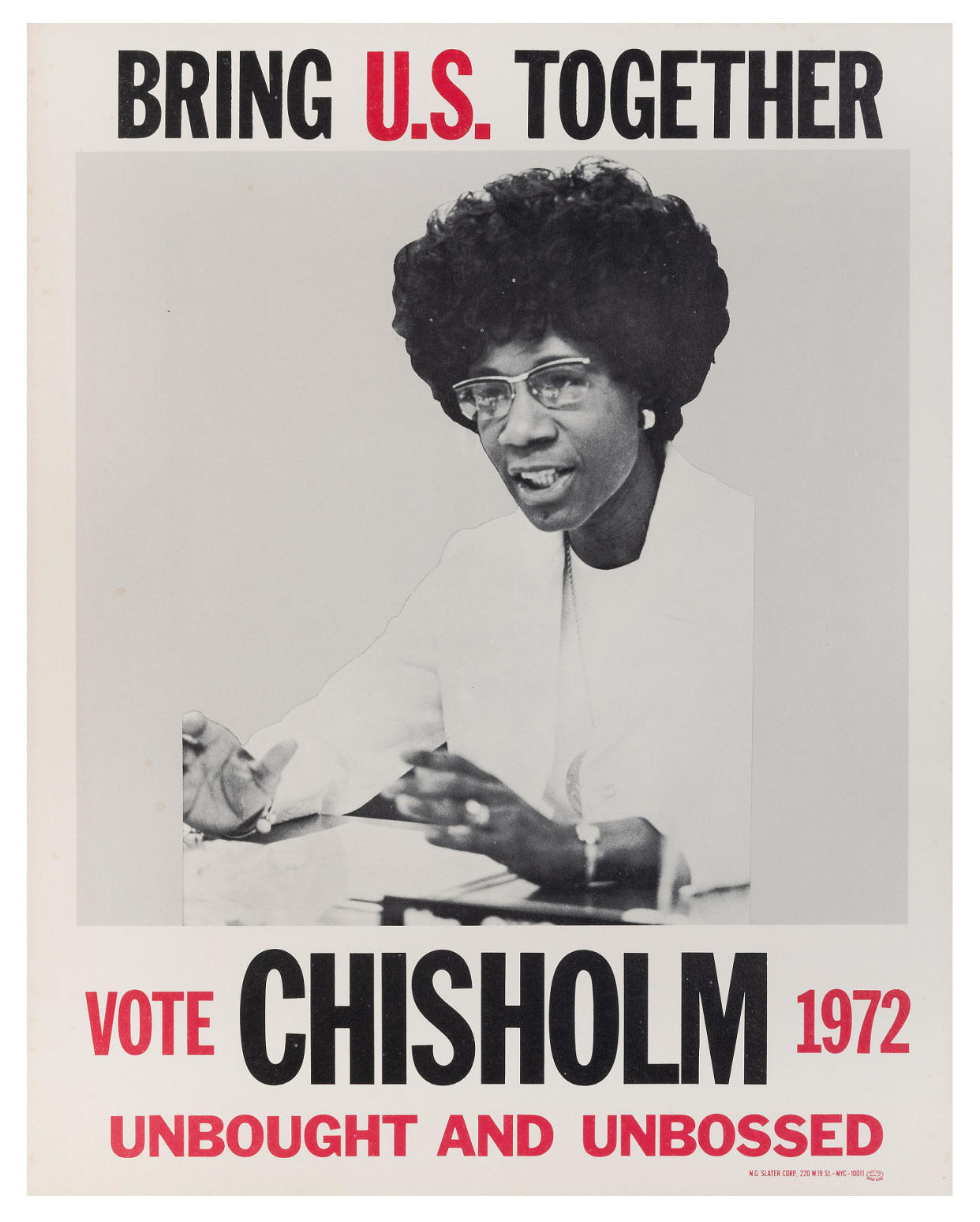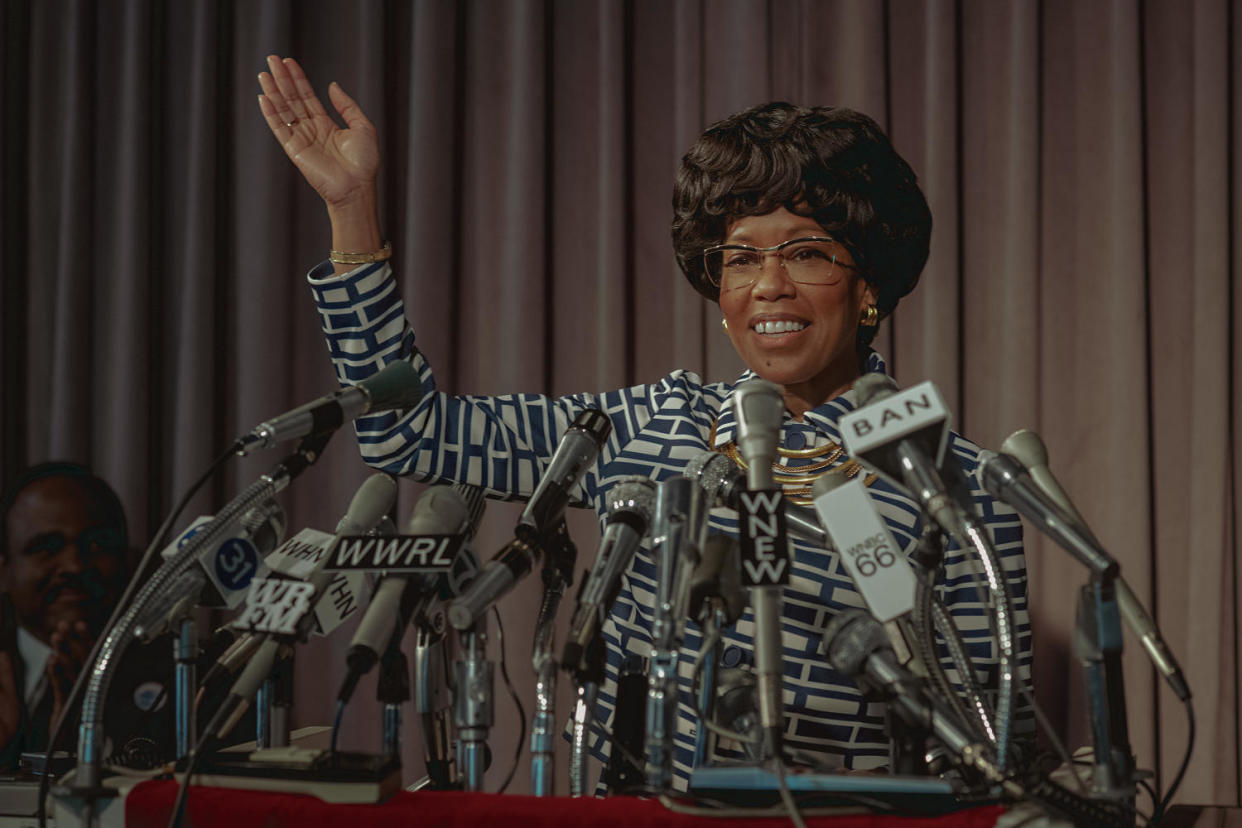Regina King was 'disappointed' people didn't know Shirley Chisholm's story. How she's changing that
Former U.S. Congresswoman Shirley Chisholm's historic 1972 run for president is the subject of a new film on Netflix starting March 22.
The film stars Regina King as the history-making politician, who was the first Black woman elected to U.S. Congress and both the first woman and first Black person to make a legitimate bid for president.
The film also hints at some of the behind-the-scenes drama in Chisholm's life — her crumbling marriage and difficult (at times) relationship with her sister.
Creating the film “Shirley” took around 15 years, Reina King, who plays Chisholm' sister Muriel St. Hill alongside her real-life sister Regina King, tells TODAY.com. She says she and her sister felt a mission to share the late Chisholm’s story.
Reina King says she often asked people if they knew about Shirley Chisholm, and “no one knew.”
“And that was disappointing,” she says. “And that was just disheartening.”
Reina King only knew about the politician though her own independent studies, not school.
"She wasn't incorporated in curriculum at any point, not even in Black History Month," she says. “Someone that has such a large contribution and impact to our history, to the fabric of America, is not being talked (about), is not being discussed."
Reina King says she hopes the film’s audience is inspired to take part in the democratic process. She adds that her favorite quote from Chisholm is one featured in the film: “Don’t throw away your vote.”
“I feel like the political process seems to be daunting for so many people,” she says. “I hope it activates and motivates people to get involved as little or as big as possible in that process and realize how much they can make a difference.”
Read on for everything you need to know about the real-life inspiration for the film "Shirley."
Shirley Chisholm's early life
Born in Brooklyn, New York, on Nov. 30, 1924, Chisholm spent much of her childhood living with her grandmother in Barbados, per her government biography. She identified as a Barbadian American and spoke with a hint of a Caribbean accent throughout her life.
She attended Brooklyn College and graduated cum laude in 1946. Chisholm went on to become a teacher before getting involved in politics in the 1950s. She was a member and organizer for various Democratic political clubs and ran for New York state assembly in 1964. She was ultimately elected and served from 1965 to 1968.
What were Shirley Chisholm’s biggest accomplishments?
Chisholm ran for U.S. Congress in 1968 after a court-mandated reapportionment plan redrew the lines of the 12th congressional district to focus on the Bedford-Stuyvesant neighborhood. Her win cemented her role as the first Black woman elected to U.S. Congress.
Four years later, on Jan. 25, 1972, Chisholm declared her candidacy for president of the United States. Her bid for the highest office in the country was historic, as she was both the first woman and Black person to seek the nomination for president from one of the two major political parties.

“I am not the candidate of Black America, although I am Black and proud. I am not the candidate of the women’s movement of this country, although I am a woman and equally proud of that. I am the candidate of the people and my presence before you symbolizes a new era in American political history,” she said in her 1972 announcement.
Chisholm's slogan for her historic run was "unbought and unbossed."

Though she did not ultimately win the party's nomination, Chisholm went on to serve in U.S. Congress until January 1983.
She then took a teaching position at Mount Holyoke College in Massachusetts and frequently gave speeches at universities throughout the country.
Chisholm was asked to be the U.S. Ambassador to Jamaica in 1993 by President Bill Clinton but she could not serve due to health issues, Clinton said in a statement at the time.
That same year, she was inducted to the National Women's Hall of Fame.
Chisholm died in 2005 at 80, NBC News reported, but her accolades continued. She was posthumously honored with the Presidential Medal of Freedom in 2015 by President Barack Obama.
In January 2018, New York governor Andrew Cuomo announced Shirley Chisholm State Park in her honor. The park, which opened to the public on July 2, 2019, is located along three and a half miles of the Jamaica Bay coastline in Brooklyn.
Shirley Chisholm's personal life
Much of Chisholm's personal life was alluded to in the film, but not explored in detail.
In real life, Shirley Chisholm married Conrad Chisholm in the late 1940s. The two never had children and would divorce decades later, in 1977.
In "Shirley," viewers watch the decline of her marriage to Conrad Chisholm. At one point, Shirley Chisholm seems to share a private moment with Terrence Howard's character, Arthur Hardwick Jr.
In real life, following her 1977 divorce from Conrad Chisholm, Shirley Chisholm would go on to marry Hardwick a few months later.
"We don't know at what point and how their relationship was evolving during that period of time while she was running for president," Reina King, who produced the 2024 film and starred as Shirley Chisholm's sister, Muriel St. Hill, tells TODAY.com.
"But ... how soon it was that they were married after her and Conrad were divorced, we know something had to be there, but we didn't want to dive (too deep.) We wanted to be respectful but also authentic and truthful that there was something there. But we're not going to speculate on what are those moments and how did that evolve."
Reina King, who is also Regina King's sister, also tells TODAY.com why Muriel St. Hill was a part of the film project.
"It was just really important for her to have her sister's story told, and I feel like it was somewhat of a touchy conversation in itself to really dig too personally into ... all the things that may have taken place in their relationship," Reina King says.
Shirley Chisholm had three younger sisters. In the film, only her sister Muriel St. Hill was featured. Throughout much of the film, the two sisters seemed at odds over Shirley Chisholm's political career.
"I think that (Shirley Chisholm) was that kind of that special breed of human to even have the guts to attempt and do what she did," Reina King says. "I think during that period of time where... the expectation of the woman is (that she is) supposed to be at home raising kids in the kitchen. It was so just out of anyone’s normal way of thinking for a woman to be stepping the way Shirley (Chisholm) was stepping."
Reina King adds that the film comes full circle with St. Hill coming around and understanding why her sister had made the choices she did.
"I think that's why you see, by the end of the movie, this kind of full circle that happens between Muriel and Shirley where Muriel understands and gets, how big and how important it was for Shirley to do what she did at all costs," Reina King says. "And that at some point, and sometimes, that made her alone on her own island, and how lonely that must have been."
What were Shirley Chisholm’s most memorable quotes?
Following Chisholm's death, in a 2005 People magazine profile, Democratic party activist and longtime friend Donna Brazile told the outlet she still recalled advice the late politician had given her: “She said, ‘If you wait for a man to give you a seat, you’ll never have one! If they don’t give you a seat at the table, bring in a folding chair.’”
Former President Barack Obama and Chisholm's mentee, Rep. Barbara Lee, has also attributed the same quote to her on more than one occasion.
Chisholm initially made a name for herself in politics by refusing to go along with the party establishment, both at a state and then later at a national level.
"She taught me ... that Black women can't go along to get along," Rep. Barbara Lee told Pete Buttigieg on his podcast, "The Deciding Decade."
"You can’t go along to get along if you’re a Black woman," Lee recalled Chisholm telling her. "...You’ve got to get in and not go along with these rules."
"She said, 'They weren’t made for you. You’ve got to go in and change the rules of the game and shake things up.'"
Chisholm's legislation in U.S. Congress often focused on educational and labor policies to improve the lives of the working class, Black people and women. She's known for several turns of phrase about being a woman, like, "The emotional, sexual, and psychological stereotyping of females begins when the doctor says, ‘It’s a girl.''"
A staunch supporter of the Equal Rights Amendment while in Congress, Chisholm threw her support behind it in hopes that it would pass. As of 2024, the amendment still has not been added to the U.S. Constitution.
In her 1981 commencement address at Mount Holyoke College, Chisholm put her own spin on the classic oyster-themed advice about boldness.
What was Shirley Chisholm's real relationship with Barbara Lee?
In the film, Barbara Lee is introduced as a young California woman who wants to make a difference in her community.
In real life, Lee and Chisholm's relationship was similar. Lee signed on to work on Chisholm's legendary presidential campaign and the two women forged a mentor/mentee relationship that lasted through the end of Chisholm's life.
In her recent campaign to become California's newest senator, Lee said in a speech that Chisholm had taken her to task upon meeting her and learning Lee hadn't registered to vote.
"'Little girl,' she said, 'You have got to register to vote and you got to help me in my campaign,'" Lee recalled. "She said, 'Look these laws these rules weren't made for you... You've got to get in there and shake things up. You got to disrupt and dismantle all of these policies and build something that is just and equal and fair for everybody.'"

Lee signed on to organize for Chisholm in the state of California and also went to Miami in 1972 as a delegate for the late politician at the Democratic National Convention — a scene featured in the film.
Lee told TODAY.com ahead of the film's release that Chisholm had inspired her to get involved in politics.
"Congresswoman Shirley Chisholm inspired me to get involved in politics at a time when I didn’t believe the government cared about people that looked like me," Lee said in a statement. "Because of Mrs. C, I am. And because of Mrs. C, so many other women of color in politics are."
Lee added that she had decided to be involved in the movie because Chisholm "deserves to be honored for her contributions to not only politics but American history."
"Director John Ridley, Regina King and the entire cast deserve praise for their work on this project," Lee concluded. "It is coming at an important time as we face a consequential election this fall, and my hope is that this film inspires the next generation to get involved and get their seat at the table."
What was Shirley Chisholm's cause of death?
Chisholm died in 2005 at the age of 80, according to NBC News. At the time, her former staffer, William Howard, told the New York Times she had suffered from several strokes just before her passing and died at her home in Ormond Beach, Florida.
This article was originally published on TODAY.com
